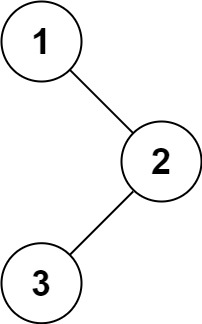LeetCode-in-All
94. Binary Tree Inorder Traversal
Easy
Given the root of a binary tree, return the inorder traversal of its nodes’ values.
Example 1:

Input: root = [1,null,2,3]
Output: [1,3,2]
Example 2:
Input: root = []
Output: []
Example 3:
Input: root = [1]
Output: [1]
Example 4:

Input: root = [1,2]
Output: [2,1]
Example 5:

Input: root = [1,null,2]
Output: [1,2]
Constraints:
- The number of nodes in the tree is in the range
[0, 100]. -100 <= Node.val <= 100
Follow up: Recursive solution is trivial, could you do it iteratively?
Solution
using LeetCodeNet.Com_github_leetcode;
/**
* Definition for a binary tree node.
* public class TreeNode {
* public int val;
* public TreeNode left;
* public TreeNode right;
* public TreeNode(int val=0, TreeNode left=null, TreeNode right=null) {
* this.val = val;
* this.left = left;
* this.right = right;
* }
* }
*/
public class Solution {
public IList<int> InorderTraversal(TreeNode root) {
if (root == null) {
return new List<int>();
}
var answer = new List<int>();
InorderTraversal(root, answer);
return answer;
}
private void InorderTraversal(TreeNode root, IList<int> answer) {
if (root == null) {
return;
}
if (root.left != null) {
InorderTraversal(root.left, answer);
}
answer.Add((int)root.val);
if (root.right != null) {
InorderTraversal(root.right, answer);
}
}
}

